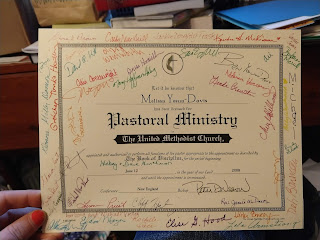First, the kids. Raising tiny humans is no joke. This is what the majority of my time and attention goes to these days. Dreams of homesteading and intentional community aside, a lot of me goes into being present for the kids (of course, the summer is its own particular beast). This is not insignificant. I need to remind myself of this. It's also a purpose that is particularly important in a community like this that values intergenerational relationships and having a school system. In the broader sense, raising children in this moment also bears with it the responsibility of nurturing small humans who value our earth, are grounded in love for God and others, and who have depths of joy and resilience to face all that may come our way in the near future.
Secondly is I have worth no matter what. Our late-stage capitalist society would have us base our value in what we can produce, but we have worth and are loved beyond what any kind of production value we may offer. Honestly, this is a harder concept for me to embody, but one I do believe this community understands at some intuitive level. I have watched countless times the ways the island has rallied around people and families facing hard times and oftentimes it is because of the relationships folks have as opposed to “what they offer the island.” This is a rare value these days. It is also, incidentally, a value of the Christian faith that professes a God who calls us “beloved” before we have a chance to do or “prove” anything to anyone. We are loved, period.
Lastly, for us, finding our village is more about proximity than anything else. I think about this mostly in regards to how my relational sphere shifted dramatically upon stepping down from the church because I wasn't in proximity to those people in the same way anymore. (I saw this concept come across my Facebook feed a few weeks ago and it has really stuck with me.) I want to nurture the people in my village as much as I can, but I also know that we're in this position where our capacity is more limited because Ben's health continues to be poor. Forming adult friendships is one of those arcane mysteries that becomes weirdly difficult after leaving high school/college/grad school and yet - proximity played a *huge* part in developing those relationships. Ben and I may be the nerdy couple who like sci-fi/fantasy novels, Dungeons and Dragons, and complicated board games (and if you are reading this and I don’t know you like these things too please let me know!) but our village isn’t primarily about a shared set of interests -- it’s about a shared set of commitments, about helping each other out, and about who you see on a regular basis.
In many ways, we’ve been rebuilding our village for the past couple of years. Our village is both geographic and digital, with people who live here, who live on the mainland, and who live thousands of miles away. Leaving the church has meant needing to find new friendships. When your job is to tend to the well-being of a system, care for people in crisis, and nurturing spiritual journeys for those connected with the church community, many relationships are pretty well-defined. Cultivating friendships as a pastor beyond those responsibilities was really hard (and for those pastors who do it well, I am in awe), and here especially so when you don’t already have generational connections to draw upon. And, to be honest, it continues to be challenging. The whole idea of village being about proximity really brought a lot of this into clarity for me, but it doesn't negate the fact that finding new centers of relational gravity takes hard work. The island is tightly knit - which is both a blessing and a curse.
I’m really thankful for this question, which allowed me the opportunity to put some pieces together that have been rattling around for awhile. It’s a question that brought me back to some places of vocation that have been on hold because of Ben’s health challenges. It's also a question that highlights the dynamics of living in a place where many people have deep family ties. The short answer to the initial question, then, is that it has been hard - not in a bad way, but in a way that has offered grist for reflection. Summer brings a lot of these pieces into stark relief as many of these dynamics get heightened to the nth degree. I’m glad that my older two kids have enjoyed playdates and friendships at camp. I’m glad there have been beach days and quiet days and even stress-filled days - because the bottom line is that I really love living here, even if there’s a lot that we can’t take advantage of right now and even if it continues to be work to rebuild a support system here. It’s been hard -- but it’s been good.


















